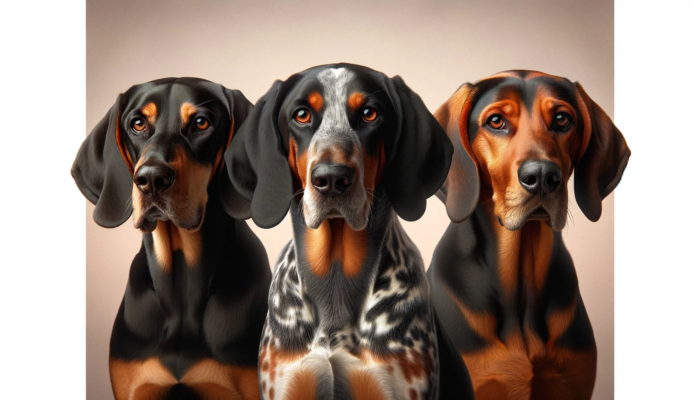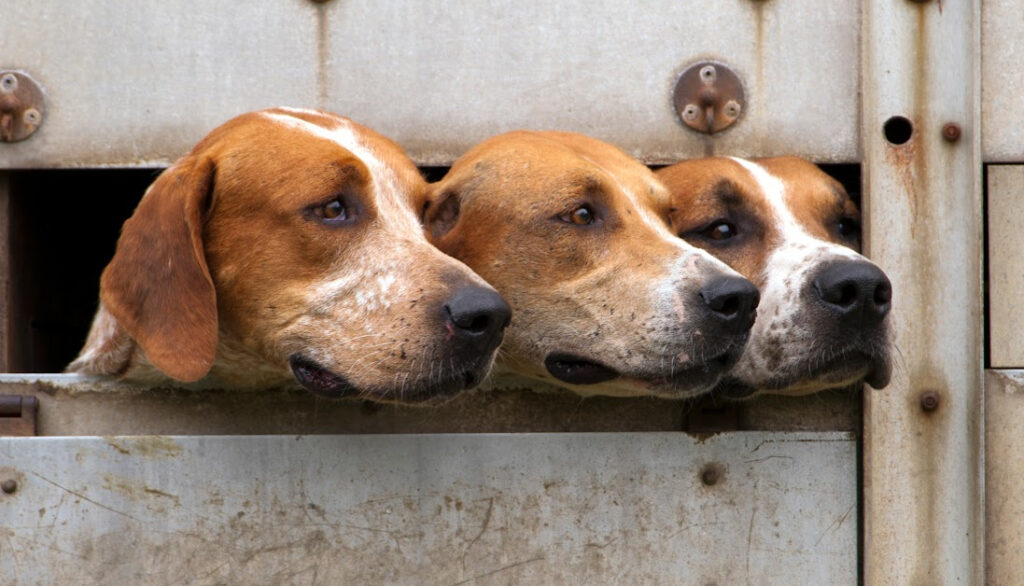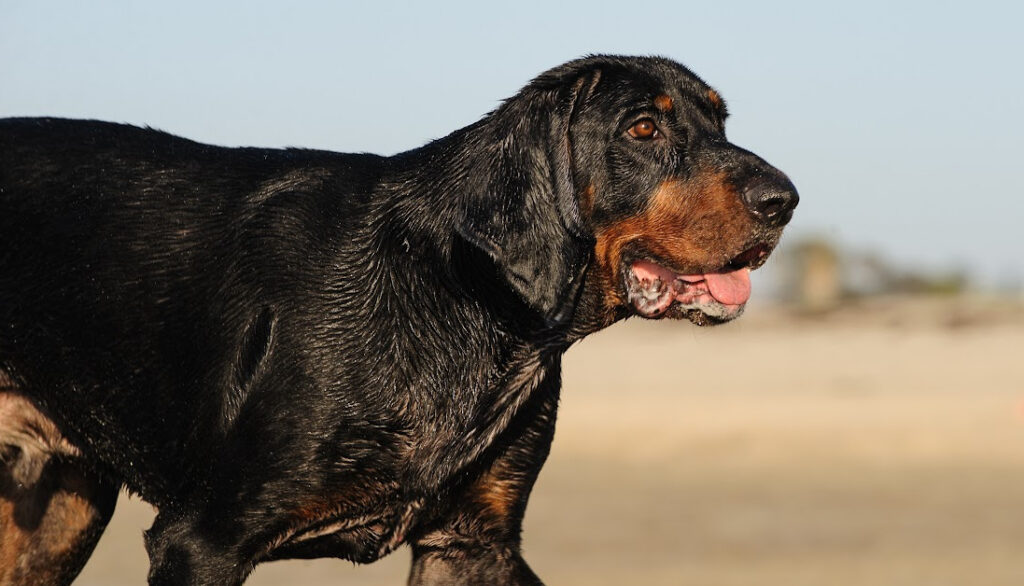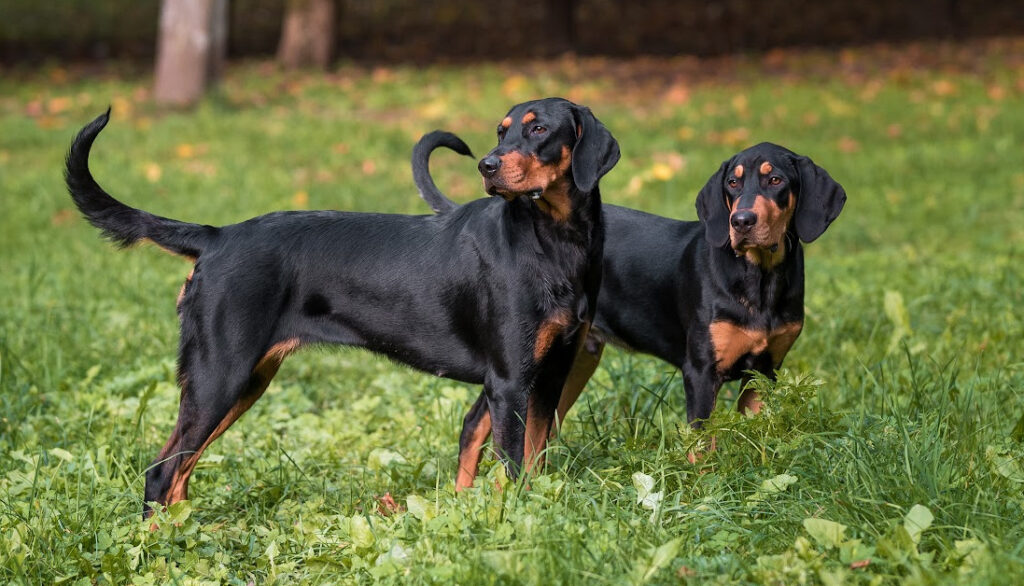Diving into the world of southern hound dog breeds is like uncovering a treasure chest full of rich history, unique characteristics, and captivating personalities. These dogs have a special allure that is deeply rooted in their southern heritage. Whether it’s their distinctive baying calls, their unparalleled tracking abilities, or their loyal companionship, southern hounds have a charm that’s hard to resist.

The heritage of these southern hound breeds is a fascinating mix of early American history and cultural significance. Originally bred for hunting and tracking, these dogs became an integral part of the southern way of life. These hounds were utilized in various types of hunting, from chasing game in the swamps to tracking deer in the woods. The unique characteristics of each breed combined with their hunting instincts, made them indispensable companions for southern hunters.
Popular southern hound dog breeds like the Bluetick Coonhound, the Redbone Coonhound, and the Plott Hound each have their own captivating stories and traits. For instance, the Bluetick Coonhound is renowned for its cold nose and deep baying voice. Such breeds have also adapted to the southern climate and terrain over time, making them well-suited to the hot summers and varied landscapes.
Behaviorally, these southern hounds are known for their tenacity, intelligence, and loyalty. They can make wonderful family pets, but potential dog parents should be aware of their high energy levels and need for mental stimulation. Proper training and consistent care are crucial to raising a happy and healthy southern hound.
When we delve into the history and characteristics of these breeds, we can truly appreciate their unique appeal and contribution to the canine world. Whether you’re a dog lover, a hunting enthusiast, or simply a fan of southern culture, there’s a lot to discover and admire about these southern hound dog breeds.

Historical Significance of Southern Hound Breeds
Imagine this: a pack of hounds baying in unison, their haunting calls echoing through the thick Southern woods. These are the southern hound dog breeds, a collection of canines with a rich history deeply intertwined with the culture and traditions of the American South.
Origins and Development in the South
Southern hound breeds originate from a myriad of places, each contributing to their unique characteristics. Various breeds were brought over by settlers from Europe, from the English Foxhounds and Coonhounds to the smaller Beagles. Over generations, these dogs were selectively bred to produce new types of hounds, perfectly suited to the harsh Southern terrain and climate. Their purpose? Hunting game, from deer to wild boars, and even bears.
Indeed, southern hound dog breeds like the American Foxhound, Redbone Coonhound, and Bluetick Coonhound were developed specifically for their scenting skills and stamina. They were expected to track game over vast distances, through swamps, forests, and fields, and they were bred accordingly.
Role in Southern Culture and Hunting Traditions
Southern hound dog breeds haven’t just contributed to hunting practices in the South; they’ve become a fundamental part of its culture. These canines have been immortalized in literature, from William Faulkner’s “The Bear” to Marjorie Kinnan Rawlings’s “The Yearling,” and even in music, with Elvis Presley’s “Hound Dog” being a prime example.
Hunting with these dogs is much more than a pastime in the South – it’s a tradition. Many southern families have been hunting with hounds for generations, passing on the practice from father to son, mother to daughter. These dogs are often considered family members and are deeply loved and respected for their abilities and companionship.
Hunting competitions, like coonhound events, are also popular in the South. These contests highlight the dogs’ tracking abilities, with awards given to the dogs that can find and tree a raccoon the fastest. Such events often turn into social gatherings, strengthening community bonds and celebrating the hard work and skills of the hounds and their handlers.
In essence, the southern hound dog breeds have played an indispensable role in shaping the South’s identity. They’ve helped settle new lands, provided food and protection, and today, they continue to be celebrated for their hunting prowess. Understanding their history and legacy is the first step to truly appreciating these magnificent dogs.
Popular Southern Hound Dog Breeds
As we delve into the South’s favorite four-legged companions, we’ll discover a variety of breeds that exhibit traits that make them incredibly popular within the Southern states. Each breed has its unique charm and characteristics that fit right into the Southern lifestyle.
List of Top Southern Hound Breeds
Let’s explore some of the breeds that have found their place in Southern homes and hearts:
- American Foxhound: Known for their endurance and speed, these dogs have a rich history in Southern fox hunting.
- Black and Tan Coonhound: As a breed native to the South, these dogs are renowned for their tracking skills and are often used for hunting raccoons.
- Redbone Coonhound: Styled for stamina rather than speed, Redbones are versatile hunting dogs with a keen sense of smell.
- Plott Hound: The state dog of North Carolina, this breed is known for its courage, intelligence, and tracking abilities.
- Blue Tick Coonhound: This breed is renowned for its ‘cold nose’ (exceptional scent tracking) and tenacity in the hunting field.
Characteristics Defining Southern Hounds
While these breeds hail from different backgrounds, they share some common traits that make them quintessential Southern hounds. Let’s take a look:
- Stellar Scent Tracking: Southern hound breeds are often celebrated for their amazing scent tracking abilities, making them excellent hunting companions.
- Endurance and Stamina: Built for the Southern terrain, these dogs are known for their remarkable endurance and stamina, traits that come in handy during long hunting trips.
- Loyalty and Tenacity: Southern hounds are known for their loyalty to their human companions and their tenacity when on a trail. They are dogs that won’t give up easily.
- Vocalization: Many Southern hound breeds have a distinct, melodic bay or howl, often used to communicate with their human hunting party.
Understanding these traits can help prospective dog owners determine if a Southern hound breed aligns with their lifestyle and what to expect when bringing one into their home. They are more than just pets; these breeds are a significant part of Southern tradition and culture. Each dog breed brings with it a slice of Southern history and charm that is sure to captivate any dog lover.
Physical Traits of Southern Hound Dogs
When discussing southern hound dog breeds, it’s essential to consider their unique physical traits. These breeds are known for their robust builds, designed to support their hunting instincts and adapt to the south’s diverse terrain.
Common Physical Features Among Breeds
Southern hound breeds, while diverse, share common physical traits that make them distinct. These breeds are generally medium to large-sized dogs with muscular and agile bodies, well-suited for endurance and robust activities. Some of the shared features include:
- Long Ears: Most of these breeds have long, droopy ears, a classic characteristic of hound dogs. These ears often reach down to their noses when pulled forward. Examples include the Redbone Coonhound and Bluetick Coonhound.
- Droopy Eyes: Southern hound dogs usually have a doleful, droopy-eyed expression, which is part of their charm. The Basset Hound is a perfect example of this trait.
- Strong Legs: These breeds have robust and muscular legs, allowing them to endure long hunting sessions and traverse various terrains.
- Sleek Coat: Most southern hounds have a short, sleek coat that’s easy to groom. The coat colors vary greatly, with some breeds like the Plott Hound having a brindle pattern, while others like the American Foxhound exhibit a bi- or tri-colored coat.
These traits not only contribute to their distinct appearance but also enhance their hunting skills, particularly their scenting ability, a hallmark of hound dogs.
Adaptations to the Southern Climate and Terrain
Southern hound dog breeds have evolved over centuries to adapt to the diverse landscapes and climates of the South. Their physical traits reflect these adaptations in several ways:
- Heat Tolerance: The short, sleek coats of southern hound breeds are not just for looks. They also play a vital role in helping these dogs tolerate the warm Southern temperatures.
- Terrain Adaptability: The robust body structure, especially their strong legs and paws, enables these dogs to traverse rough terrains, from swampy lowlands to rocky mountains.
- Endurance: These dogs are known for their exceptional endurance. They can cover large distances without tiring, an adaptation to their historical role as hunting dogs where they would track game for miles.
Understandably, these physical traits influence the care, training, and living conditions suitable for these breeds. As a dog parent, familiarizing yourself with these traits is key to ensuring your southern hound’s health and happiness.

Temperament and Personality of Southern Hounds
Southern hound dog breeds are not just known for their physical prowess and hunting abilities, but they’re also cherished for their remarkable temperament and personality. Let’s delve into the behavioral traits of these southern canines and their compatibility with families and work environments.
Behavioral Traits of Southern Canines
Southern hound dogs are typically known for their loyalty, intelligence, and determination. These dogs are often bred for hunting, which requires a high level of focus and persistence. As a result, they are generally characterized by their tenacity and problem-solving abilities.
These hounds are also known for their keen sense of smell. This trait, combined with their inherent curiosity, makes them excellent explorers. However, this can sometimes lead them to become easily distracted, especially when they pick up an interesting scent.
Despite their hunting background, southern hounds are usually gentle and friendly, showing affection towards their owners and even strangers. They are often very social dogs, enjoying the company of humans and other dogs alike. However, their hunting instincts can sometimes make them less suitable for homes with small animals unless they are properly socialized from a young age.
Compatibility with Families and Work Environments
When it comes to compatibility with families, southern hound dogs often make excellent family pets. They are generally good-natured and patient, making them suitable for families with children. Their sociability also means they usually get along well with other dogs, making them a great choice for multi-dog households.
However, their high energy levels and need for mental stimulation mean they require plenty of exercise and activities to keep them occupied. This makes them less suitable for apartment living or for families who aren’t able to provide them with the exercise they need.
In a work environment, southern hounds can be a valuable asset. Their intelligence and problem-solving abilities make them excellent working dogs, capable of performing tasks such as tracking and search and rescue. Their loyalty and determination also mean they are often willing to work hard for their handlers.
However, their strong sense of smell and curiosity can sometimes be a distraction in a work environment. Therefore, they require consistent training and socialization to ensure they can focus on their tasks.
In conclusion, southern hound dog breeds are characterized by their loyalty, intelligence, and determination. They are generally good-natured and sociable, making them suitable for families and work environments. However, they require plenty of exercise and mental stimulation, making them less suitable for apartment living or inactive families. Their strong sense of smell and curiosity can also be a distraction, requiring consistent training and socialization.
Training and Caring for Southern Hound Breeds
When it comes to training and caring for Southern hound breeds, there are unique facets to consider. These dogs are known for their tenacity, intelligence, and sometimes stubborn nature. They’re wonderful dogs, but like any breed, they have specific needs.
Best Practices in Training Southern Hounds
One thing I always tell pet parents with southern hound breeds is that patience is key. Training these dogs is not always a walk in the park. They are instinctively independent due to their hunting heritage and may sometimes display an independent streak. So, it’s important to employ positive reinforcement techniques when training, such as giving treats, praise, or a favorite toy when they follow commands.
- Begin training early: Starting when they’re puppies can help instill good behavior from a young age.
- Regular exercise: These breeds often have a high energy level and require plenty of physical activity to keep them from becoming bored and possibly destructive.
- Consistency: Keep your training sessions consistent and regular so they understand what’s expected of them.
You might also want to consider professional obedience training or a canine good citizen class. They’re great for teaching your hound manners and social skills, and can be a lot of fun, too!
Health and Grooming Needs Specific to the Breed
Southern hound breeds are generally healthy dogs, but like any canine, they have certain health and grooming needs. Regular vet check-ups and vaccinations are essential to keep your dog healthy and prevent disease. Make sure you’re feeding your hound a balanced diet, and keep an eye on their weight, as some hounds can be prone to obesity.
When it comes to grooming, most southern hounds have short, dense coats that are fairly easy to maintain. Regular brushing will keep their coat looking its best and help reduce shedding.
- Ear care: Because of their floppy ears, hounds can be prone to ear infections. Regular cleaning and checks are a must.
- Dental care: Regular teeth cleaning is important to prevent oral issues and bad breath.
- Nail care: Regular nail trims help to keep your hound comfortable and prevent overgrowth that can lead to issues with walking or injury.
Remember, every dog is an individual, so these are general guidelines. Your vet can provide the best advice for your particular hound’s health and grooming needs.
Understanding the specific requirements of southern hound dog breeds is essential for their well-being. They are wonderful companions who will return your dedication and care with unwavering loyalty and affection.

The Role of Southern Hounds in Modern-Day Hunting
Southern hound dog breeds have played a crucial role in the southern hunting tradition for centuries. These dogs, bred for perseverance, tracking skills, and a keen sense of smell, continue to play a significant role in contemporary hunting practices.
Southern Hounds in Contemporary Hunting Practices
The enduring popularity of Southern hounds in hunting can be attributed to their exceptional characteristics. Breeds like the Redbone Coonhound, the Black and Tan Coonhound, and the Bluetick Coonhound are favorites among hunters for their tracking skills and resilience.
– Redbone Coonhounds are prized for their adaptability. Whether it’s hunting on different terrains or pursuing various game, these dogs prove their worth in every situation.
– Black and Tan Coonhounds bring a blend of strength and agility to the hunt. Their ability to track and tree game, even in harsh conditions, is unmatched.
– Bluetick Coonhounds are beloved for their persistence. They can follow a cold trail and are known to stay on a trail for hours, even days.
These breeds are not just adept at hunting for sport but also play a significant role in pest control, helping maintain the balance in local ecosystems.
Preserving the Hunting Heritage of Southern Breeds
There is a remarkable cultural value in preserving the hunting heritage of these Southern hound breeds. Hunters and breeders alike recognize the importance of these dogs’ legacy and work hard to ensure their hunting instincts and skills are maintained.
Programs and events like field trials, hunting tests, and coonhound events provide an opportunity for these dogs to demonstrate their remarkable hunting abilities. These gatherings also serve as a platform for breeders, trainers, and owners to exchange knowledge and promote the responsible breeding and training of these dogs.
However, it’s important to acknowledge that the use of these dogs in hunting should always be done responsibly and ethically. Humane treatment of the dogs and respect for the game pursued should always be the priority.
Responsible hunting practices with these breeds include:
– Ensuring the dogs are well-trained and under control at all times.
– Always using a tracking system to avoid losing the dogs.
– Not hunting in extreme weather conditions.
– Respecting wildlife laws and seasons.
While the role of Southern hounds in hunting has evolved over time, their significance in the South’s hunting culture remains. Their enduring legacy is a testament to their incredible abilities and the deep bond between these dogs and their handlers. For many, the Southern hounds’ place in contemporary hunting practices is a proud continuation of a rich heritage, a tangible connection to the past, and a cherished tradition to be passed on to future generations.
Preserving the Legacy of Southern Hound Breeds
Conservation Efforts for Rare Southern Hounds
It breaks my heart to know that some of our beloved southern hound breeds are becoming rare. But the good news is that there are conservation efforts underway to preserve these beautiful dogs. Many organizations and breed enthusiasts are working tirelessly to ensure that these breeds don’t vanish into the annals of history.
Take the Plott Hound, for instance. It’s a breed that’s native to North Carolina and has the distinction of being the state’s official dog. However, it is now considered rare. Organizations like the Plott Hound Association of America are doing their part to promote and conserve the breed.
Then there’s the Redbone Coonhound, another dog breed that has its roots in the South. The breed is known for its hunting skills and distinctively melodious bark. Conservation efforts for the Redbone Coonhound involve promoting awareness about the breed, encouraging responsible breeding, and supporting rescue organizations dedicated to this breed.
Promoting Responsible Breeding and Ownership Practices
As a dog parent, you have a crucial role to play in preserving the legacy of southern hound dog breeds. How? By promoting responsible breeding and ownership practices. Here’s how you can contribute:
- Sourcing your dog from a reputable breeder who prioritizes health, temperament, and breed standards over profits. This ensures that the breed maintains its distinct traits and health.
- Neuter or spay your hound if you don’t plan on breeding them. This helps control the dog population and reduces the number of unwanted dogs.
- Provide proper training and socialization to ensure your hound dog is well-behaved and gets along with people and other pets.
- Regular vet check-ups and keeping up with vaccinations can help ensure your southern hound lives a long, healthy life.
Owning a southern hound is like carrying a piece of southern heritage and tradition. These dogs have been part of our history, our hunting trips, and our families for generations. They’ve adapted to our climate, our landscapes, and our lifestyle. They’re more than just dogs; they’re a symbol of the South.
In doing so, we don’t just keep a dog breed alive; we keep a part of our history and culture alive. We ensure that future generations also get to experience the joy, companionship, and adventure that come with owning a southern hound dog breed. So, carry this legacy forward. Be a proud southern hound dog parent.
Remember, our actions today will shape the future of these incredible breeds. So let’s make a commitment to protect, preserve, and promote our beloved southern hound dog breeds. Their future is in our hands.
Frequently Asked Questions
Q1: What are some popular Southern Hound Dog Breeds?
A: Some popular Southern Hound Dog Breeds include the American Foxhound, Coonhound, and the Plott Hound.
Q2: What are the typical characteristics of Southern Hound Dog Breeds?
A: Southern Hound Dog Breeds are typically known for their strong sense of smell, endurance, and their friendly and loyal nature.
Q3: Are Southern Hound Dog Breeds good with families and children?
A: Yes, Southern Hound Dog Breeds are generally known to be good with families and children. They are often friendly, patient, and protective, making them great family pets.
Q4: How much exercise do Southern Hound Dog Breeds typically require?
A: Southern Hound Dog Breeds are typically active and require regular exercise. This can include daily walks, playtime in the yard, or other forms of physical activity.
Q5: What type of care do Southern Hound Dog Breeds require?
A: Southern Hound Dog Breeds require regular grooming due to their short, dense coats. They also require regular exercise and a balanced diet to maintain their health.
Dr. Candy, a holistic veterinarian and certified raw dog food nutrition specialist, graduated from Oklahoma State University in 2009 with a DVM and has since specialized in companion animal nutrition, advocating for species-specific diets. With a background in wildlife rehabilitation and oil spill response, she combines holistic health and conventional medicine in her unique approach to treating chronic diseases, allergies, and autoimmune conditions in pets. As the owner of a veterinary practice in Colorado and an author, Dr. Candy is dedicated to educating pet parents and improving the health and happiness of animals.




